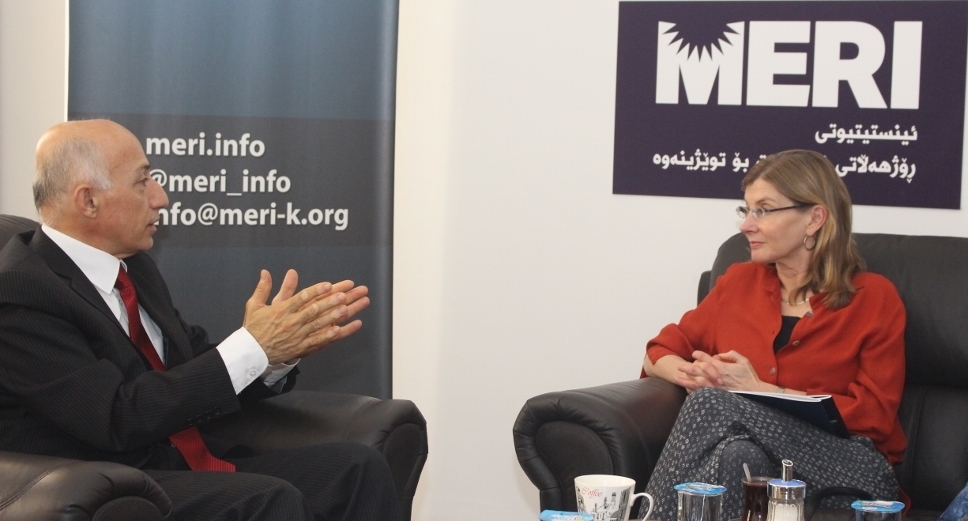“The United States Institute of Peace (USIP) is actively engaged with partners on the ground in Iraq and continues to explore ways of assisting further. We have heard much about MERI and were keen to visit and discuss issues of mutual interest with you” said Ms Nancy Lindborg, President of USIP, during her visit to MERI’s office in Erbil on 10 September, 2015.
Ms Lindborg headed a senior USIP delegation to Erbil, which included Ms Manal Omar, the Acting Vice President for Middle East and Africa; Mr Elie Abouaoun, Program Director; Osama Gharizi, Program Officer; Viola Gienger, Senior Editor; and Ali Sleiman, the Regional Program Manager.

The delegation were particularly interested in issues relating to internally displaced people and refugees, and wished to learn more about current KRG strategies for both their short and long term future.
Professor Dlawer Ala’Aldeen, President of MERI, appreciated this visit and valued future engagement with USIP on issues that relate to peace, stability and democracy in the Kurdistan Region of Iraq and the wider Middle East. He offered MERI’s help and collaborative engagement towards achieving common objectives.
The USIP President, Ms Nancy Lindborg offered to host MERI’s delegation during their upcoming visit to Washington DC. MERI is planning to present a number of research projects, including the Kirkuk and Minority Rights Policy Reports, in Washington in October and update the think-tank community about the latest developments in Iraq.
* * * * *
About MERI: The Middle East Research Institute is Iraq’s leading policy-research institute and think tank. It is an independent, entirely grant-funded not-for-profit organisation, based in Erbil, Kurdistan Region. Its mission is to contribute to the process of nation-building, state-building and democratisation via engagement, research, analysis and policy debates.
MERI’s main objectives include promoting and developing human rights, good governance, the rule of law and social and economic prosperity. MERI conduct high impact, high quality research (including purpose-based field work) and has published extensively in areas of: human rights, government reform, international politics, national security, ISIS, refugees, IDPs, minority rights (Christians, Yezidis, Turkmen, Shabaks, Sabi mandeans), Baghdad-Erbil relations, Hashd Al-Shabi, Peshmarga, violence against women, civil society. MERI engages policy- and decision-makers, the civil society and general public via publication, focused group discussions and conferences (MERI Forum).

